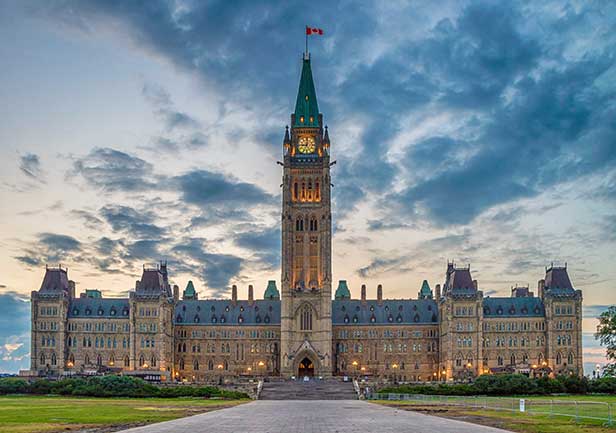CANADIAN NEWS June 11, 2020
Canadian Government Proposes Penalties for CERB Fraud
Officials want to see stiff fines and even jail time for those who’ve gamed the system. But without unanimous opposition support for a new bill, its future is uncertain.
Canadian Prime Minister Justin Trudeau has announced stiff penalties for Canadians who have deliberately frauded the COVID-19 Economic Response Plan, specifically when it comes to applying for the $2,000-a-month Canadian Economic Response Benefit (CERB). But the penalties, laid out as part of a new legislative bill that the Liberals attempted to bring to Parliament this week, caused an outcry among officials and the public, throwing into question what the penalties will ultimately be and how the government will enforce them.

According to a draft of the bill released this week, wrongdoing would include making false claims, not declaring all income, deliberately receiving funds for which the person isn’t eligible, continuing to receive the benefit while refusing to go back to work after the employer has requested they return or receiving a job offer and failing to disclose relevant facts that would impact eligibility.
As businesses open back up, Trudeau says the government is working to smooth out the next step, a transition from widespread reliance on CERB to implementing more of the Emergency Wage Subsidy (CEWS) so businesses can restore payroll.
“[CERB] was put in place in a way that we knew would maximize the speed with which it would reach the millions of Canadians that needed it,” said Trudeau during a press conference this week. “That’s why we didn’t put a tremendous amount of complicated … background checks and verifications up front because we needed to flow that money quickly to the millions of Canadians that had no more paychecks and didn’t know how they were going to pay for their groceries or their rent.”
Trudeau went on to say that unfortunately, and as expected, there are those who’ve deliberately defrauded the system. Now that CERB has been in place for several months, the Liberal government’s legislation would allow them to penalize those individuals, with fines of up to $5,000 (including a retroactive fine of triple the amount they received fraudulently) and jail time of up to six months. Trudeau emphasized that the penalties would be aimed at bad actors, not those making honest mistakes during the application process.
That’s good news, because according to the Canada Revenue Agency (CRA), Canadians have made almost 190,000 repayments of response benefits they weren’t eligible for. Spokesperson Christopher Doody also said the CRA is investigating 600 tips it received about fraudulent use of CERB and other benefits. This week, Jean-Yves Duclos, president of the Treasury Board, said Canadians quickly applied for CERB because of financial pressure upon losing their jobs, and there was “understandable confusion” with the different eligibility requirements for CERB and Employment Insurance.
Canadians have made 190,000 repayments of the Canada emergency response benefits they weren't eligible for.
— CBC News (@CBCNews) June 10, 2020
Canada Revenue Agency is also reviewing 600 tips on alleged misuse of the CERB. https://t.co/bub57wXpYH @OttawaReporter
“The new CERB was indeed very new,” he said. “Most Canadians had difficulty understanding exactly how and when it would be delivered.” The CRA said it will continue looking at the eligibility of those who received funds, including during the next tax filing season.
The Liberals provided a draft of the new bill to their colleagues in the House this week, hoping it would be pushed through in an accelerated fashion that’s been used for previous COVID-19 economic aid legislation. However, it found no unanimous opposition support, making the path forward unclear. The legislation also included a process for getting support payments to Canadians with disabilities.
The Conservatives and New Democratic Party (NDP) have voiced concerns about the retroactive CERB penalties, saying it could hurt those who are trying to return to a semblance of normality after the virus. In particular, NDP leader Jagmeet Singh said he’s concerned that, with the threat of steep penalties, people may feel compelled to stop receiving CERB and return to work in unsafe conditions, such as workplaces without adequate health and safety measures, or if the worker has a vulnerable family member in their care. He’s called for recovering repayments using the tax system instead.
Both the Conservatives and Bloc Québécois have said that Trudeau’s administration must present a governmental fiscal update before they’ll discuss the new legislation. Conservative leader Andrew Scheer continues to push for a debate on government spending in the interest of oversight; fiscal matters have not been formally debated since the fall of 2019, and he and other officials are calling for a full resumption of House of Commons business before they’ll consider the new legislation.
Since Justin Trudeau lost his majority in the fall, there hasn’t been a single debate on government spending.
— Andrew Scheer (@AndrewScheer) June 8, 2020
He’s tried to grab power at every turn.
He’s letting you down.
Conservatives will continue to hold him accountable. https://t.co/Jg1p9qCKMk
The House is slated to meet June 17, and officials say there are other items on the docket up for discussion ahead of the new bill.
The recent wrangling comes as the Parliamentary Budget Officer reports that extending CERB past the original end date of Oct. 3, 2020, to January 2021 – a possible move that’s been discussed in recent weeks – would cost almost $60 billion in additional funding. Budget officer Yves Giroux says letting Canadians receive benefits for 28 weeks (up from 16 weeks) may be an incentive not to go back to work. However, the new legislation may address that situation, since the benefit will end if recipients don’t return to work when it’s reasonable to do so, their employer asks that they return or when they receive a reasonable job offer.
As of June 4, more than 8 million Canadians had applied for the CERB, with $43.5 billion in payouts.
